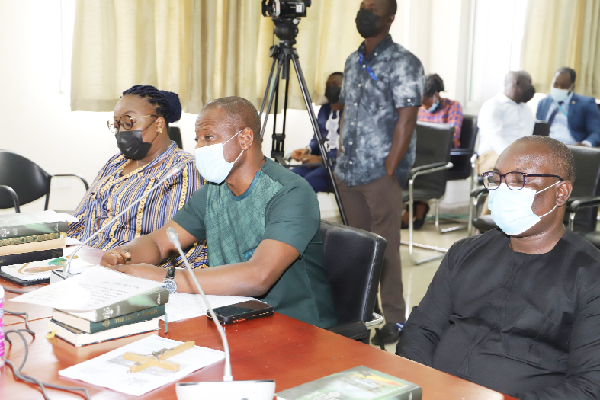
GHS appeals for medical refrigerated trucks
The Director-General of the Ghana Health Service (GHS), Dr Patrick Kuma-Aboagye, has appealed to the government to help the service to acquire the appropriate medical refrigerated trucks to aid the transportation of critical medical supplies to the six new regions.
He said the new regions were faced with many challenges in terms of healthcare, a reason the service needed additional support to deliver medical supplies such as vaccines that required the use of trucks with cold compartments.
Advertisement
Besides, he said, the COVID-19 pandemic had also expanded the logistics requirement of the GHS, creating the need for the new regions to have high-capacity storage facilities in order to keep the vaccines under good condition.
“We are currently adopting innovative ways of using cold boxes in trucks we use to transport vaccines so that they are kept at low temperatures before they reach the next level,” he said.
Question
Appearing before the Public Accounts Committee (PAC) of Parliament yesterday, Dr Kuma-Aboagye said although the GHS had vehicles to transport medical supplies, they also had to depend on third-party logistics entities to transport medical commodities that required the use of cold fridges or cold chain facilities.
“Apart from the six new regions, every region has a cold van, and three of such vehicles are being kept at the national level,” he said.
He was responding to questions raised by the Auditor-General’s 2020 Performance Audit Report on the distribution of medical supplies in Ghana from 2016 to 2020.
Per the report on logistics for distribution, the Audit Service found out that the requirement for transporting some medical supplies under cold conditions were not met.
It said at various regional medical stores, third-party logistics and budget management centres (BMCs) transported medical supplies in vehicles which did not have cold chain compartments although appropriate vehicles were presented during procurement.
The report also said poor internet connectivity and storage facilities hindered the effective operation of the stock management systems of the various regional medical stores.
He also answered questions on the usefulness of the drone services to distribute drugs to hard-to-reach areas, including riverine communities, preventive measures to secure regional medical stores, delays of medical supplies to some community-based health planning and services (CHPS) compounds, shortage of medical supplies to medical stores, expiry of medical supplies at medical stores, capacity of human resource to handle medical supplies at medical stores, among others.
Storage conditions
Dr Kuma-Aboagye said the GHS had moved on from using normal trucks to deliver medical supplies to adopting the Ghana integrated logistics management system to give the service real time information about where logistics were needed.
He said all those logistics ran on national infrastructure although there were some areas where transporting trucks were unable to reach.
Under such circumstances, he said, there was the need to resort to the use of drones, tricycles and motorbikes to deliver logistics to health facilities.
Dr Kuma-Aboagye also responded to findings on the lack of temperature monitoring devices, coupled with poor conditions under which medical supplies were stored.
He acknowledged the situation as unfortunate but said the service was addressing the issues with its monitoring exercises.
He, however, said the service, with support from UNICEF and other partners, recently distributed about 300 refrigerators to the various storage facilities to ensure proper keeping of medical supplies.
Reclamation bond
Earlier, the Executive Director of the Environmental Protection Agency (EPA), Mr Henry Kokofu, took his turn to answer questions on the findings of the Auditor-General on matters relating to the performance of the agency.
He specifically answered questions pertaining to the failure of the EPA to ensure that prospective small-scale miners provided reclamation bonds as a security for reclamation in the event where mined areas were abandoned.
He said the law that established small-scale mining, the Small-scale Gold Mining Law, 1989 (PNDCL 218), did not have a regulatory mechanism for such industry, making the demand for reclamation bonds on small-scale mining firms a challenge.
“The major stakeholder in all these has to do with the banks who have to open an escrow account that will be in the name of the EPA and the mining companies involved so that 20 per cent of their estimated cost will be paid in cash into that account,” he said.



